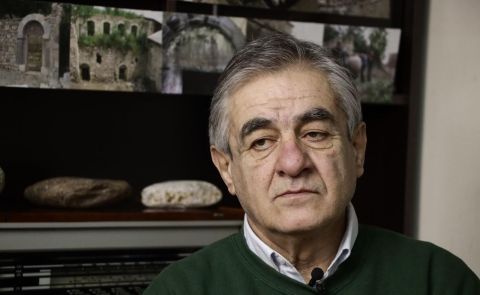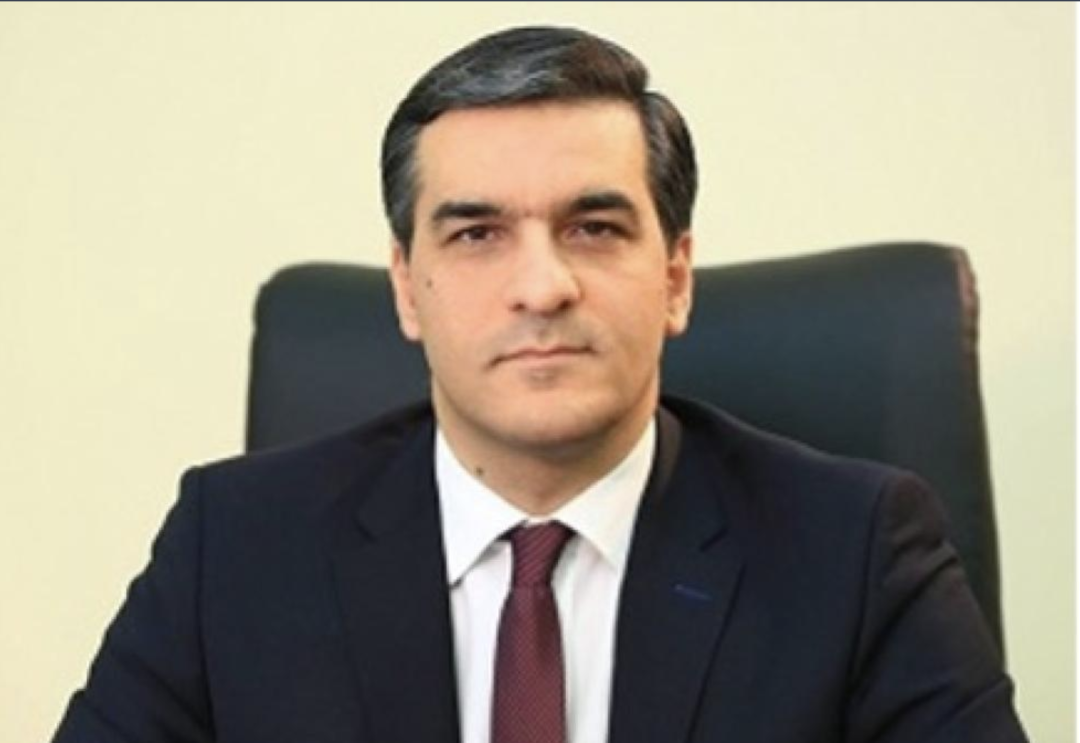
Arman Tatoyan: Armenians between Might and Right

Arman Tatoyan has placed himself at the epicenter of a controversy that has historically defined many diaspora nations: Armenia, Israel, Greece, Ireland. The question is whether the state represents its citizens or, more broadly, the nation. Professor Tatoyan is primarily a human rights advocate, focusing on the national collective rights of Armenians as "a people" rather than merely as citizens.
An American-educated lawyer, he served as Armenia's human rights ombudsperson from 2016 to 2022 and as an ad hoc judge at the European Court of Human Rights. He previously headed the European Committee for the Prevention of Torture at the Council of Europe. During his tenure, Professor Tatoyan denounced the withdrawal of Armenian troops from Karabakh and accused the government of undermining the independence of the judiciary.
This adversarial legal approach to the defense of Armenian rights is popular at home and abroad. Public opinion polls in 2022 showed that the Ombudsman's office was one of the most trusted public institutions. Although Mr. Tatoyan has avoided direct political involvement, the government has often accused him of politically motivated campaigns. In substance, there seems to be a clash between what is "right" from a legal-normative perspective and what policymakers in Yerevan consider possible in terms of realpolitik.
The Tatoyan Foundation continues to argue that reaching an agreement with Azerbaijan at the negotiating table does not guarantee the rights of Karabakh Armenians. Making the case for Armenian rights in legal terms has garnered the support of diaspora networks in Europe, Russia, and the United States, much of which supports the work of documenting elements of Azerbaijani practice with a view to taking Azerbaijan to court. This position refutes the "might is right" approach that often guides realistic accommodation of diplomatic practice.
For example, the Tatoyan Foundation has attempted to deconstruct the claim that the blockade of the Lachin Corridor connecting Karabakh to Armenia was caused by environmental activists, or that the exodus of the Armenian population of Karabakh in September 2023 was an entirely voluntary affair. As the Karabakh government refuses to dissolve the self-proclaimed Republic of Nagorno-Karabakh, Caucasus Watch turned to Mr. Tatoyan to discuss the state of play in this relationship between might and right in Armenia.
The exodus of over 100,000 Armenian refugees from Nagorno Karabakh. Some are still in Yerevan; some have already left. This development has opened up a discussion over the “right to return.” As a legal advocacy platform, where is the work of the Tatoyan Foundation focused in that respect?
This is an important question and there is a disconnect between the Diaspora and the government over the matter. This friction can be traced back to the point in which Yerevan recognised Nagorno-Karabakh as part of Azerbaijan. In practice, the government did very little in September 2023, militarily or otherwise, to prevent the mass deportation Nagorno Karabakh Armenians.
There should have been more action to reduce the scope of Azerbaijani maximalist agenda. A military response would, of course, be difficult. When I was the Human Rights Defender, I criticised the government for ignoring the human rights and security of the population, prioritising exclusively the political and military dimensions of its relationship with Baku.
Focusing on the refugees. Our focus is on the right to return. These people were deported as “a people,” as a nation, as Armenians, not as individuals. They were forced to leave their homeland facing specific threats to their lives. Of course, the right to property should also be addressed. So, there is a guaranteed right to return.
Therefore, our work focuses on collecting evidence and documenting crimes. We are documenting forced displacement tactics pursued by the Azerbaijani Army. And as we present these briefs, we will be preparing to pursue advocacy campaign in international organizations forums.
To be clear, Azerbaijani authorities argue that they have never forced the population of Nagorno-Karabakh to leave their homeland, which is a lie. They were killing people and taking people as captives for years. And our work is difficult, because making these cases is not on the current agenda of the government. It has only formal nature mainly due to political interests. These people have the right to return.
Beyond international Courts and if you are not going to litigate in Yerevan or Baku, you would probably need to make a case for individual property rights, as this can be pursued on behalf of individuals in the US, France, or Russia. Is that part of your planning? To litigate on similar cases, you would need the data from Nagorno Karabakh, currently in the custody of the Armenian government. Is there any platform of cooperation on that front?
We are working with the government of Nagorno-Karabakh, now in exile, which we regard as the competent authority. We have requested data pertaining to property and we are building a case. Due to lack of resources, we have to prioritise. The focus now is collective rights.
Regarding international litigation more broadly, following the war in Ukraine, it appears that Europe’s normative architecture is more fragmented. Put otherwise, it does not look like the whole of Europe has a common human rights baseline. Do you feel that in this context it is meaningful to pursue international litigation? Can you see any sense in international human rights advocacy in this environment, given the polarisation of Russia and the West?
Unfortunately, this polarisation is also evident in our case. International human rights advocacy often does not yield results. There is an international human rights concept to which I frequently referred to during the Armenian-Azerbaijani conflict, namely the principle that human rights violations should be ignored. I have made this case in international conferences that the case of Armenia proves this principle is fictional and has little resonance with reality on the ground. It is unhelpful.
Nevertheless, we have to try. We need to pursue human rights campaigning against Azerbaijani efforts to remove the issue from the agenda, leveraging economic and diplomatic steps.
So, in making this “collective case,” building a case and litigating, where do you see your battleground?
If we are talking about International Courts, there are three courts: the International Court of Justice, the European Court of Human Rights, and the International Criminal Court.
And where would you have the best chance?
Well, we need to use all three instances. Unfortunately, the UN’s International Court of Justice (ICJ) order issued against Azerbaijan in February 2022 – ordering the opening of the Lachin Corridor and an end to the blockade – was simply ignored. That was at the time argued on the basis of the International Convention on the Elimination of All Forms of Racial Discrimination, with the Court recognising that “it was plausible” that Azerbaijan. Is causing shortages of food, medicine, and life-saving supplies. So, we have to try.
Once the Statute of the International Criminal Court comes into force for Armenia, we will consider litigating there for deportation.
Finally, regarding property rights, we will be taking our case to the European Court of Human Rights. We need to fight on every front, everywhere.
What about the recent expulsion of Azerbaijan from the Parliamentary Assembly of the Council of Europe. Does this expulsion in fact undermine or support Armenian interests, if you are thinking of international litigation?
This decision was important but not sufficient. It is important in providing a consensus and or legal rationale that we can refer to in the future. In practice, the move would need to be accompanied by economic sanctions against Azerbaijan to be effective.
So, are you also building cases for individuals and families: specific houses, specific land, specific businesses? If so, where will you take the case? Moscow, Paris, Los Angeles?
Well, individual cases are for the moment beyond the scope of action of the Tatoyan Foundation. However, if I were to pursue similar cases, I would make the case to international bodies before going to trial: the UN Human Rights Council, the High Commissioner for Human Rights, the Council of Europe, and so forth.
We have a Diaspora support base and we work with a number of platforms in the US, Paris, Brussels, Moscow, and Germany. We have a multi-layered Diaspora network, and we cooperate with the Armenian National Committee, the Armenian Assembly of America, the Union of Armenian-German lawyers, etc. We work with a range of Diaspora institutions on a project-basis.
So, there is no integrated legal platform to which individual actors contribute. There are different campaigns that cooperate but do not necessarily join forces. In this scheme, is the government running its own campaign for the collective right to return?
I don’t think it is on the current government agenda. I am not excluding the possibility the government is pursuing backchannel support, but there is no public diplomacy on this matter.
Do you fundraise on the basis of individual campaigns, or you campaign more broadly for the foundation?
Generally, we campaign for the Foundation. We campaign mostly between Armenians in the Diaspora, with rare occasional contributions by international bodies.
We actually rarely do any specific fundraising activity, only rarely, occasionally. These were open events. Most contributions to the foundation come from motivated individuals rather that structured campaigning. People sometimes contribute as little as $10.
Beyond Nagorno-Karabakh, which is currently a priority, we also look at a broader agenda. Look, Azerbaijan is laying claims over the whole of Armenia’s sovereign territory. They are preparing grounds for aggression. We conduct research on their real intentions. Baku is clearly not after peace.
And how does this documentation translate into legal or rights-based advocacy? What is the normative agenda beyond the right to return for the Karabakh refugees? Can we be more specific?
We are working on three individual property rights cases related to citizens of Nagorno Karabakh. We are also working on documenting crimes and state-supported hatred of Azerbaijani authorities, not only of Armenians but more broadly of Christian populations. We have specialists who are doing mostly archival research in that respect. In doing this work, we enlist a number of international lawyers for each case and each campaign. It works and it is formidable.
Contributed by Ilya Roubanis
See Also


Irina Mamulashvili: Electoral Interference is a Playbook, not a Recipe

Giorgi Gakharia: The EU Should Engage Georgia Despite Its Democratic Backsliding

Peace or Capitulation? Shahverdyan on Armenia-Azerbaijan Agreement and the Nagorno-Karabakh Crisis

Ali Mousavi Khalkhali: Iran Will Avoid Conflict in the Caucasus

